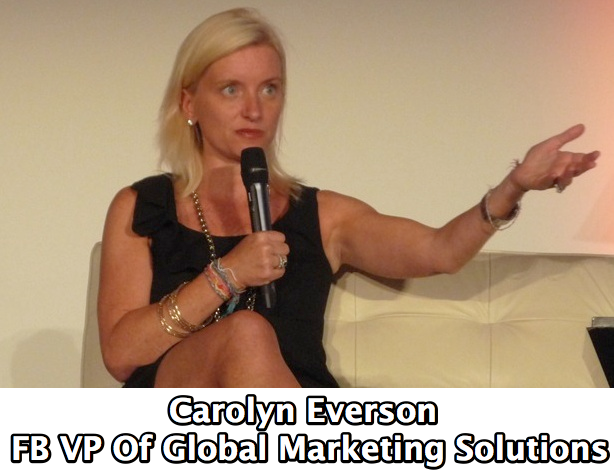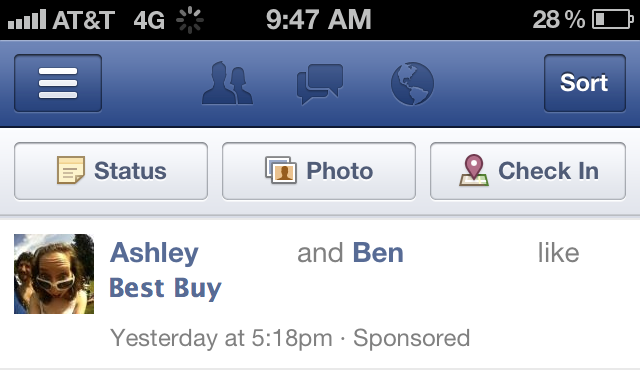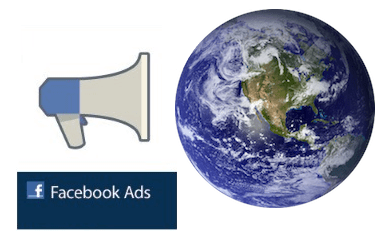Facebook may one day let advertisers target mobile users based on their exact current location, but VP Carloyn Everson did not confirm that such a product is in the works to Bloomberg, Facebook tells me. The New York media company misinterpreted statements from Everson, who merely said you could imagine the product evolution afforded by a mobile phone’s location awareness.
So we won’t say Facebook is “readying” such a product, but that doesn’t mean it won’t emerge eventually. let’s imagine how it could look. Real-time hyper-local Facebook advertising could allow local businesses to advertise to people in sight of their brick-and-mortar store, or let travel companies target people when they’re away from their home city. And competition to reach those out-and-about users could drive up ad prices and earn Facebook more money.
Facebook tells me nothing new was announced or confirmed in the few questions Everson answered for Bloomberg at the Cannes Lions conference in France this week. Everson merely said Facebook has been testing new ad products (which it’s been doing for years), there’s “really significant interest” in mobile news feed ads, and that “phones can be location-specific so you can start to imagine what the product evolution might look like over time, particularly for retailers.”
That’s much less specific than what Bloomberg published — that Facebook “says it’s working on a location-based mobile-advertising product that will allow companies to target users with real-time data showing their whereabouts.” Such a particular product was not confirmed.

But with 500 million users accessing Facebook from mobile, it has a lot of location data to rely on, and Inside Facebook’s Brittany Darwell says she has ad industry sources who say Facebook is looking into more accurate local targeting. Plus in January 2011 Facebook acquired Rel8tion, which specialized in hyper-local ad targeting. This could combine with the new Facebook Exchange real-time ad bidding system announced last week to create a powerful new product for advertisers.
Here’s how it would work. When you open your mobile app (if Facebook had permission to pull in your GPS coordinates) or when you published a location-tagged post, Facebook would learn your location and assume you’d be nearby for the next few minutes. Advertisers would pre-submit creative elements to be shown to users in specific locations, and possibly a maximum bid they’d pay to have their ad shown. When you’re in one of these areas, Facebook would match you with advertisers and either automatically serve highest-bed pre-made hyper-local ad, or ask a demand-side platform hired by the advertiser to make a bid and then show the ad of the auction’s winner.
For example, the Best Buy electronics chain could set up ads targeted to people within 1000 feet of all its retail locations in the U.S. who Like Best Buy, other electronics stores, or devices it sells. When you open your Facebook app while walking or driving nearby, you’d see in your news feed a mobile Sponsored Story about how your friend had interacted with Best Buy, or possibly an offer for a discount from Best Buy that could make you more likely to visit the physical store.

Another possible flow would be that a travel company like Hipmunk could target ads to users who are more than 500 miles from their listed “current city” and are in a popular tourist destination. So when I’m in London instead of my home in San Francisco, I could be shown mobile ads reminding me that Hipmunk is an easy way to book cheap flights.
Some users might not be entirely comfortable with this hyper-local targeting, but Facebook would likely stress that all data is anonymized and no business would know your personal location, just that one of their targets was successfully advertised to. For years Facebook has pushed the boundaries of privacy and sharing, and with time many those product decisions, such as the news feed and check-ins, end up being accepted or even enjoyed. Now a public company, Facebook will need to see if it can push those same boundaries to benefit businesses, not just your connection to your friends.
[Image Credit: Colm Bracken]
